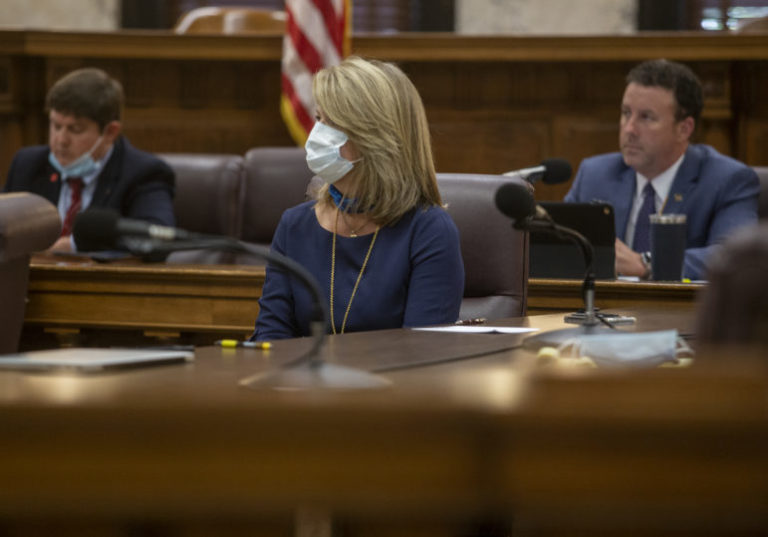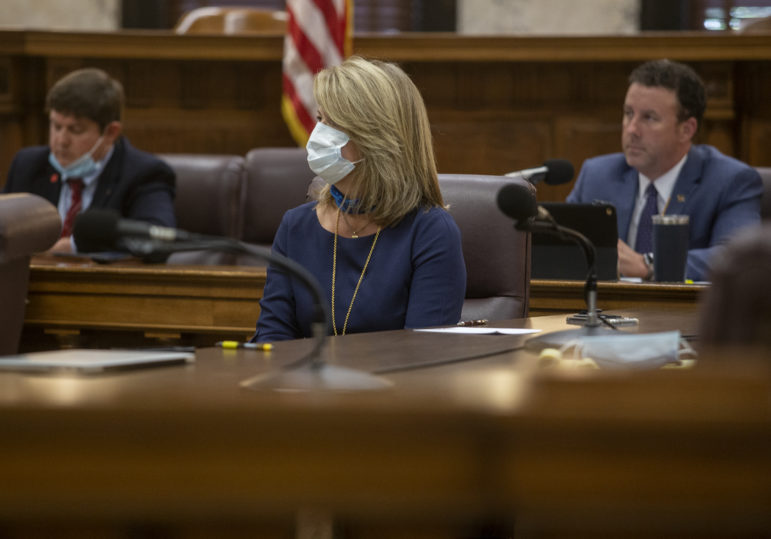

Eric J. Shelton/Mississippi Today
Economic development committee members listen to a presentation during an economic development committee meeting at the Capitol in Jackson, Miss., May 7, 2020.
The decision to extend Mississippians’ tax deadline until July 15 will likely force Gov. Tate Reeves and the Legislature to dip into the rainy day fund to balance the budget for the current fiscal year that ends on June 30.
It is likely too late to make budget cuts in the current fiscal year to offset the revenue shortfall that is beginning to amass as a result of the economic slowdown related to the COVID-19 pandemic – leaving the rainy day fund as the best option to offset drops in tax collections.
Reeves recently said the state’s Working Cash Stabilization Fund, commonly called rainy day fund, contains $550 million. Under current law, the governor can spend $50 million in the fund without legislative approval.
“If that becomes necessary, we will work with the Legislature to make that happen,” Reeves said of dipping into the rainy day fund. “It is certainly a possibility.”
Lt. Gov. Delbert Hosemann said earlier that he was hopeful leaders could make it through the current fiscal year without dipping into the fund and have it on standby for the next fiscal year when sluggish tax collections also are expected. While revenue was expected to plummet during the final months of the current fiscal year because of the coronavirus-induced economic slowdown, officials hoped there was enough of a financial cushion to avoid the use of the rainy day fund. Before the pandemic hit, state revenue collections had been moderately strong.
But when officials decided earlier this month to move the income tax filing deadline to July 15, it meant that money the state normally collected in the current fiscal year – because of the April 15 deadline to file tax returns – would not be collected until the next fiscal year as people delayed filing their tax returns. The state opted to move its filing deadline to July 15 to coincide with the delay granted on the federal level to give those struggling with the fallout of COVID-19 more time to file their taxes.
The delay should boost revenue collections for the next fiscal year, but with many businesses closed in March and April and with record unemployment, revenue collections still are expected to be dismal at least early in the upcoming fiscal year, making budget cuts in areas like education, health care and law enforcement a possibility.
For April, revenue collections – thanks in large part to postponing the tax filing deadline to July 15 – were $244 million short or 29.5 percent short of the official projection, according to the report released on Monday by the Legislative Budget Committee.
April’s dismal report means the financial cushion that the state had going into the month of April has evaporated. The state has now collected $26.3 million or .57 percent less in revenue than the amount that was appropriated during the 2019 session to fund state agencies and education entities, making it likely that the rainy day fund will be needed to plug budget holes.
The big drain on revenue was, of course, because of the personal income tax collections – related at least in part to the postponement of the filing deadline. Personal income tax collections were $125.8 million or 43.5 percent below the estimate. But most other sources of revenue also were down. The sales tax collections were down $17.6 million or 8.9 percent while the corporate tax collections, which also were impacted by the delay until July 15 to file, were down 50.8 percent or $89.9 million.
One of the only bright spots was the use tax collections, which is a 7 percent tax collected primarily on internet sales. They were up 6.3 percent, or $1.7 million, in April.
The Legislature’s work in May and June to pass a budget for the upcoming fiscal year will be impacted by the drop in tax collections, making budgets cuts a possibility. Legislators are hoping to pass a teacher pay raise for the upcoming fiscal year of about $1,000 annually, costing $78 million. The revenue situation will make that effort more difficult.
The post COVID-19 could force governor, legislators to turn to rainy day fund this fiscal year appeared first on Mississippi Today.
- Jackson officials back House proposal to create new water utility board, despite some locals’ concerns - February 16, 2026
- Speaker Jason White: House ‘not afraid’ of school choice special session - February 16, 2026
- ‘Primary Trust’ at New Stage has a message for this moment - February 16, 2026